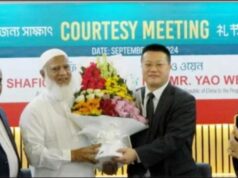In August last year, He Ajun left the education sector due to China’s crackdown on private tutoring. However, she has since discovered an unexpected career path as an unemployment influencer.
A Shift To Freelancing
At 32, He Ajun, based in Guangzhou, shares career advice and chronicles her experience of long-term unemployment with her 8,400 followers. In December, she posted, “Unemployed at 31, not a single thing accomplished,” capturing the challenges she faced.
Despite these struggles, she now earns around 5,000 yuan ($700) per month through various means. These include ads on her vlogs, content editing, private consultations, and selling handicrafts at street stalls. He believes freelancing will become the norm, stating, “Even if you stay in the workplace, you’ll still need freelancing abilities. I believe it will become a backup skill, like driving.”
China’s Economic Challenges
China’s government is pushing for advancements in science and technology, including AI and robotics. However, this focus has led to weaker demand in other sectors, leaving a generation of educated young people without suitable job opportunities.
In 2023, a record 11.79 million university graduates faced an unprecedented shortage of jobs, with widespread layoffs in white-collar industries like finance. Companies such as Tesla, IBM, and ByteDance have also made significant job cuts. The urban youth unemployment rate for the 16-24 age group surged to 17.1% in July 2023, although analysts believe the true figure is much higher.
Moreover, even the gig economy, once a fast-growing sector, is now facing overcapacity. Several cities in China have reported oversaturation in the ride-hailing market this year.
The situation is also bleak in government employment. Historically considered secure, this sector has not been spared from job cuts. Beijing announced a 5% reduction in its workforce, and provinces like Henan and Shandong have laid off thousands of workers since 2022.
The Impact On Young Graduates
China’s vocational college graduates, numbering 3.9 million, are mainly prepared for low-end manufacturing and service jobs. Unfortunately, these roles do not align with the needs of the emerging digital economy. The country currently faces a shortage of skilled professionals in areas such as welding, caregiving, and digital technology.
Yao Lu, a sociologist at Columbia University, estimates that around 25% of college graduates aged 23-35 are employed in jobs that do not match their qualifications. As a result, many of China’s 48 million university students may face low starting salaries and limited contributions to the economy over their lifetimes. This is seen by some experts as a significant waste of human capital.
A Changing Perspective On Unemployment
In this challenging job market, young Chinese people are turning to social media to share survival tips for long-term unemployment. Platforms like Xiaohongshu have seen hashtags such as “unemployed” and “unemployment diary” gain over 2.1 billion views. These platforms allow unemployed youth to connect, share experiences, and redefine what it means to be unemployed in today’s economic climate.
He Ajun believes that graduates should consider adjusting their ambitions. “If we have indeed entered ‘garbage time’,” she suggests, “young people could accumulate skills or do something creative, such as selling things via social media or making handicrafts.”
(With Inputs from Reuters)
Research Associate at StratNewsGlobal, A keen observer of #China and Foreign Affairs. Writer, Weibo Trends, Analyst.
Twitter: @resham_sng





